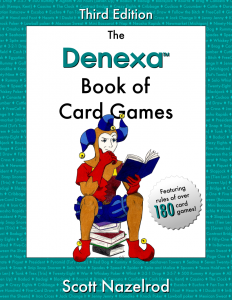Game rules index
This page contains a list of all the game rules we’ve posted to our blog, sorted by game family. You can also view the list alphabetically.
Can’t decide and want to learn all the games? You can get an ebook with the rules to over 180 card games by signing up for our email service!
While we have the rules for many of the world’s most popular card games, it would be impossible to list them all. If your favorite isn’t here, though, we’d be happy to hear about it! Drop us a line and tell us what we’re missing out on.
Authors games
Games in this category have the same basic mechanic as Authors: players ask each other for cards that they need.
Betting games
Games that typically involve money changing hands as a result of the outcome of hands. Of course, almost any game can be a betting game if you try hard enough (by playing for, say, one cent a point, or even simply agreeing to pay a certain amount to the winner of the game).
Poker games are listed separately under their own heading below.
- Ace-Deuce-Jack
- Backhand
- Badugi
- Blackjack
- Bourré
- Brag
- Commerce
- Crash (Thirteen-Card Brag)
- Farmer
- Faro
- Guts
- Horse Race
- In-Between
- Kabu
- Mini Baccarat
- Mus
- Newmarket (Michigan)
- Paiute
- Pif Paf
- Play or Pay
- Pontoon
- Put and Take
- Red Dog
- Seven and a Half
- Seven Twenty-Seven
- Skin
- Thirty-One
- Trente et Quarante (Rouge et Noir)
- Ziginette
Commerce games
Games in this category have the same basic mechanic as Commerce: players exchange cards one at a time until someone is happy with their hand.
- Cash (Kemps, Kent)
- Commerce
- James Bond
- Knock Poker
- Paiute
- Schwimmen
- Stop the Bus (Bastard)
- Whiskey Poker
Counting games
Games that depend on each card having a numerical value. Usually, the values of the cards are simply added together to arrive at a desired total (or a higher one than the opponent), but some games allow subtraction or even multiplication and division to come into play.
- Backhand
- Blackjack
- Buried Treasure
- Cribbage
- Cuttle
- Farmer
- Fifty-One
- Jubilee
- Ninety-Nine
- Pontoon
- Seven and a Half
- Seven Twenty-Seven
- Thirty-One
- Twenty-Four
Children’s games
- Authors (Go Fish)
- Beggar My Neighbor
- Concentration
- Egyptian Ratscrew
- Jack Change It
- Jenny Jenny
- Old Maid
- Pig
- Pirate
- Slapjack
- Sampen
- Snap
- Snip Snap Snorem
- Spoons
- Stealing Bundles
- Through the Window
- War
Climbing games
Games in this category feature game play where players continually play higher and higher cards or combinations of cards.
Fishing games
Layout games
Games where the goal is to fill in or complete a layout of cards. Usually, there are rules governing which cards can be placed where.
Partnership games
All games that are traditionally played in fixed pairs or teams. (There are some games where players form temporarily alliances that change from hand to hand; these are not listed here.)
- Botifarra
- Burraco
- Canasta
- Cash (Kemps)
- Contract Bridge
- Court Piece (Rang)
- Envite
- Euchre
- Five Hundred
- Hasenpfeffer
- Omi
- Samba
- Sedma
- Spades
- Tresette
- Tute
- Twenty-Eight
- Whist
Poker variants
Poker games generally revolve around comparing your hand to that of your opponents, using a standardized ranking of Poker hands. Games in the Poker family also almost always involve betting, allowing players to judge the apparent strength of their opponents’ hands and quit the game early if they feel they are outclassed. (Games in this family which don’t generally include betting are marked with an asterisk.)
Players new to poker might want to check out our guide to poker as well.
- 3-2-1 Drop
- 3-5-7
- Anaconda
- Chinese Poker
- East–West*
- Iron Cross
- Five-Card Draw Poker
- Follow the Bitch
- Knock Poker*
- Liar’s Poker*
- Mexican Sweat
- Omaha
- Open-Face Chinese Poker
- Pai Gow Poker
- Pineapple
- Poke
- Razz
- Soko (Canadian Stud)
- Texas Hold’em
- Three Card Poker
- Triple Draw Lowball
- Ultimate Texas Hold’em
- Whiskey Poker
Reaction games
Games where a player has to quickly react to a particular action, such as a signal from another player, or a particular card being revealed.
Rummy games
Games in this category follow the basic pattern of Rummy, where play centers around arranging cards into particular combinations called melds. Most Rummy games share a typical flow of game play: the player draws a card (usually from either the stock or the discard pile), forms melds if able, and discards a card.
- 500 Rummy
- Carousel
- Conquian (Coon Can)
- Continental Rummy
- Gin Rummy
- Indian Chief
- Jersey Gin
- Kaluki (Caloochi)
- Khanhoo
- Kowah
- Oklahoma Rummy (Arlington)
- Panguingue (Pan)
- Pay Me
- Pif Paf
- Rumino
- Rummy
- Seven Rummy
- Three Thirteen Rummy
- Tong-Its
- Tonk
- Yaniv (Jhyap, Dhumbal)
- Zetema
Canasta group
This subgroup of the Rummy family are generally partnership games played with multiple decks. Melds of seven or more cards carry special status. Usually, at least one of these is required to go out and end the hand.
Contract Rummy games
This subgroup of the Rummy family requires players to meet a contract (a certain number and type of melds) in order to go out, which changes on each successive hand.
Shedding games
Games in this family are won by the player who runs out of cards first (or, in some games, are lost by the last player stuck with cards).
- Durak
- Getaway
- I Doubt It
- Kings in the Corner
- Neosho Rapids
- Pitty Pat
- President
- Sampen
- Speed
- Thirteen (Tien Len)
Solitaire games
Games for one player.
- Black Hole
- Bridge Solitaire
- Canfield
- FreeCell
- Forty Thieves (Napoleon at St. Helena)
- Golf
- Klondike
- Pyramid (Tut’s Tomb)
- Seahaven Towers
- Spider
Competitive solitaire games
Games for two or more players, but the game otherwise operates according to solitaire-style rules. Often, this takes the form of players each playing their own individual solitaire games, but some portion of the layout (like the foundations) is shared.
Stops games
Games in this family have the distinction of the progression of game play sometimes being brought to a halt by the unavailability of a needed card.
- Bartok
- Comet
- Crates
- Crazy Eights
- Fan Tan
- Go Boom
- Last One
- Newmarket
- Page One
- Play or Pay
- Spinado
- Rolling Stone
- Trex (a.k.a. Trix)
Strategy games
While most card games involve at least a little strategy, and some can be given broad, in-depth study, most of them involve managing the random cards you’re given. The games in this category greatly reduce or eliminate the luck of the draw altogether. Some of them even allow players to know the whereabouts of every card in the deck. Others have you swap hands with your opponent and play the same cards again from the other side to see if you can do any better.
Trick-taking games
Games in this family have players contribute cards to tricks, which are then captured by one of the players (usually the highest card of the same suit of the first card played).
- Agram
- All Fours (Seven Up)
- Back Alley
- Bacon
- Bridgette
- Briscola
- Botifarra
- Bourré
- Buck Euchre (Dirty Clubs)
- Calabrasella
- California Jack
- Calypso
- Canadian Salad
- Cinch
- Contract Bridge
- Couillon
- Court Piece (Rang)
- Cucumber
- Democracy
- Écarté
- Envite
- Euchre
- Fipsen
- Five Hundred
- Fünfzehnern (Fifteens)
- Getaway
- Gong Zhu
- Hasenpfeffer
- Kaiser
- King
- Linger Longer (a.k.a. Sift Smoke)
- Loo
- Malilla
- Mattis
- Mighty
- Minnesota Whist
- Myllimatti (Skitgubbe)
- Nap
- Nine-Card Don
- Oh Hell!
- Omi
- Pepper
- Pitch
- Piquet
- Pluck
- Poke
- Preference
- Rams
- Ribs
- Rolling Stone
- Schafkopf
- Scotch Whist
- Sedma
- Skat
- Solo
- Solo Whist
- Spades
- Tresette
- Trex (a.k.a. Trix)
- Tribello
- Truc
- Truco
- Turnover Bridge
- Tute
- Twenty-Five
- Twenty-Eight
- Twenty-Nine
- Tyzicha
- Whist
Nullo games
In this subset of trick-taking games, the aim is to avoid taking particular cards in tricks. In many cases, this results in players trying to avoid taking tricks at all.
Trick-taking and melding games
Games in this category allow players to score points both by taking tricks (as above) and by forming melds (as in the rummy group).


